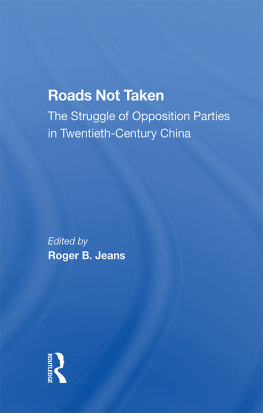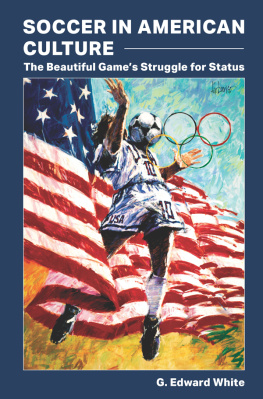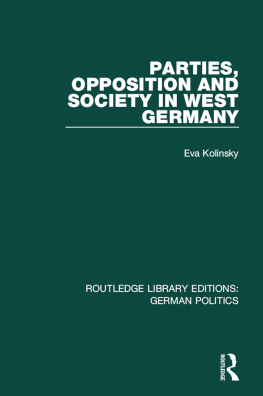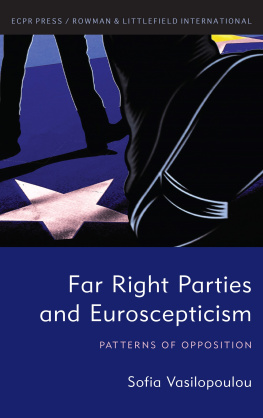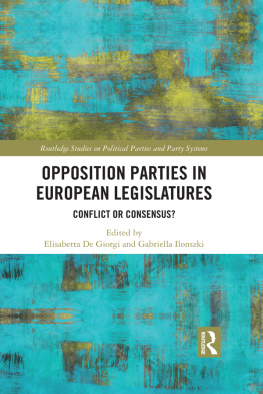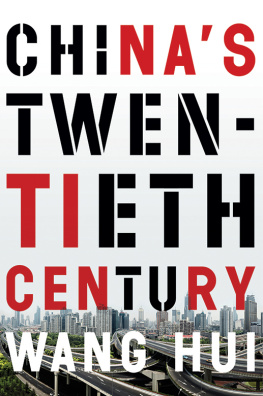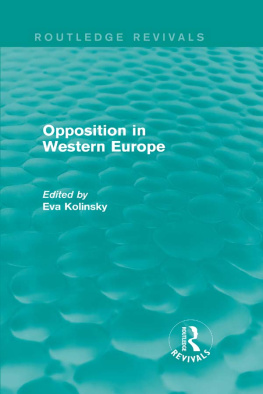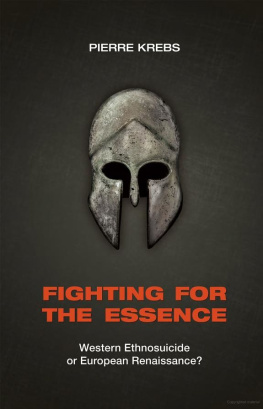Roads Not Taken
Roads Not Taken
The Struggle of Opposition Parties in Twentieth-Century China
Edited By
Roger B. Jeans
First published 1992 by Westview Press
Published 2019 by Routledge
52 Vanderbilt Avenue, New York, NY 10017
2 Park Square, Milton Park, Abingdon, Oxon OX14 4RN
Routledge is an imprint of the Taylor & Francis Group, an informa business
Copyright 1992 Taylor & Francis
All rights reserved. No part of this book may be reprinted or reproduced or utilised in any form or by any electronic, mechanical, or other means, now known or hereafter invented, including photocopying and recording, or in any information storage or retrieval system, without permission in writing from the publishers.
Notice:
Product or corporate names may be trademarks or registered trademarks, and are used only for identification and explanation without intent to infringe.
Library of Congress Cataloging-in-Publication Data
Roads not taken: the struggle of opposition parties in twentieth
century China / [edited] by Roger B. Jeans.
p. cm.
Includes index.
ISBN 0-8133-8619-5
1. China,Politics and government20th century. 2. Political
partiesChinaHistory. I. Jeans, Roger B.
DS775.7.R64 1992
320.951dc20 92-21651
CIP
ISBN 13: 978-0-367-28616-3 (hbk)
For my late friend and colleague Minor Lee Rogers
Contents
, Roger B. Jeans
, Roger B. Jeans
, Fredric J. Spar
, Thomas D. Curran
, J. Kenneth Olenik
, Parks M. Coble
, Lawrence N. Shyu
, Peter Ivanov
, Lloyd E. Eastman
, Edward S. Krebs
, Marilyn A. Levine
, Edmund S.K Fung
, Yang Tianshi (translated by Young-tsu Wong)
, John F. Copper
, James D. Seymour
, Andrew J. Nathan
, John Israel
Guide
The idea for this collection of articles grew out of the work a number of historians are doing on an assortment of minor political parties, groups, and their leaders. These opposition parties have not received sufficient attention from specialists on twentieth-century China. Moreover, writings on these groups and figures are scattered (mostly journal articles and dissertations). Hence, the time has come to collect and publish such writings in a single volume.
These essays focus on either a single figure, a party or parties, or a movement Most deal with political opposition in the Republican period (1912-1949). In addition, four contributors have written about the fate of opposition organizations from the pivotal year of 1949, when the Chinese Communists took the Mainland and drove the Guomindang into exile on Taiwan, through the Communists" crushing of the popular demonstrations in Beijing in June 1989. The final essayist has transcended the case studies to present an overview of oppositional politics in twentieth-century China.
The editor has incurred many debts while preparing this book. Its publication would not have been possible without the generous support of the Andrew W. Mellon Foundation and Washington and Lee University. I am grateful to Don C. Price, Stephen R. MacKinnon, Bradley K. Geisert, William C. Kirby, Thomas A. Metzger, James P. Harrison, Shao-chuan Leng, and Frederic Wakeman, Jr., for many insights, which they will readily recognize in the introduction.
Publication of this volume would not have been possible without the excellent work of Mrs. Karen Lyle, who rendered valuable assistance with the editing of the essays, as well as preparation of the final manuscript. I am indebted also to Mrs. Adrienne Bodie for her superb editorial assistance.
Many other people at Washington and Lee helped with this work. Two in particular should be singled out. My late friend and colleague, Minor Lee Rogers, provided irreplaceable moral support over the years that have gone into this work, and I shall miss his counsel very much in the years to come. The idea for the book owes much to Dean John W. Elrod, and his support has never wavered during the years of preparation.
My wife, Sylvia, has listened patiently far too long to my mutterings about this work. I am deeply grateful to her for being such a good friend and source of support, as well as for shouldering the onerous task of the final proofreading of the volume.
Last, but certainly not least, I am indebted to the contributors. They cheerfully responded to repeated deadlines and requests for corrections and clarifications. I hope the appearance of our book has made all their hard work worthwhile.
Roger B. Jeans
Since almost all the essays in this volume, when originally submitted, used the pinyin system of romanization, the decision was made to adopt it for the entire work. Introduced by the Chinese in the 1950s, it is the official romanization system in the People's Republic of China. In this country, it has been the standard in the press for some dozen years or so, and many recent works of scholarship have adopted it, rather than the older Wade-Giles system. Students of modern Chinese history, of course, need to be familiar with both systems.
Exceptions to the use of pinyin in this volume have been made for names and terms that are more familiar in earlier spellings, such as Chiang Kai-shek, rather than Jiang Jieshi, and the Whampoa, instead of the Huangpu, Military Academy. A table of conversions between pinyin and Wade-Giles may be found in a number of general works on modern China (e.g., Jonathan Spence's The Search for Modern China ),
Roger B. Jeans
The contributors to this volume have believed for some time that the history of Republican China, as written by both Chinese and American scholars, has been skewed toward a two-dimensional study of the major combatants, the Guomindang (GMD) and the Chinese Communist Party (CCP). That struggle, which lasted throughout the 1920s, 1930s, and 1940s--now hot, now cold--was undeniably the main historical story. However, it was not the only nor the complete story. Many educated Chinese rejected both of the one-party dictatorships, and some chose to found or support alternative parties or movements. Or, as Soviet scholar Peter Ivanov's essay puts it, without consideration of the potential political alternatives of the time, "history is incomplete, simplified, and too burdened with the triumphs of the 'great forces', leaving no room for the natural pluralism of thought, romanticism, and intrigue." A concentration on the two major parties denies the various choices that were made and the roads that were still open during these years, until closed by the march of events. In short, history, as always, is more complex than hindsight would seem to indicate.
This volume of essays on opposition figures, parties, and movements attempts to flesh out the incomplete history of this period. It is the first extensive collection of case studies on these men and groups to appear in the English language and includes essays by Australian, Canadian, Chinese, and Soviet, as well as American, scholars. Despite their different nationalities most of the contributors, it is safe to say, shared a single bias, that is, a desire to see China move in the direction of democratization. In a number of cases, the articles are based on full-length studies that have been in progress for some time. Hence, there is ample evidence here of what these men thought, what they did, and what their fates were.

